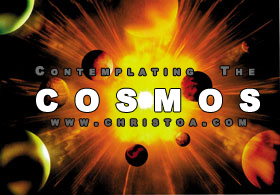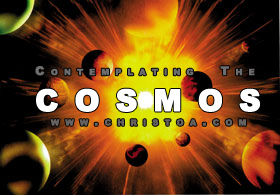“…we live in an in-between universe, where things change, but according to patterns, rules, or, as we call them, laws of nature.”[1]
I am amazed at the fact that there are certain governing authorities over my existence on this earth, this cosmic shoreline. I can walk along and gravity holds me to the ground. Still, it allows me enough freedom to move along as I wish without dropping me into the dark chill of the universe. This same force holds the earth in orbit around the sun, and holds the sun in orbit around the super-massive black hole at the center of the galaxy. This force forms stars and those stars become so hot that they fuse the chemicals needed throughout the universe. There is such order.
For a moment, I am going to assume that such an order exists in and of itself. It remains that there are laws that govern the order seen in the universe. I am going to think particularly regarding the law of gravity. From the inception of the universe, gravity has been responsible for the collection of matter within the universe. Planets and stars form because of gravitational pull. Nebulae do not dissipate because gravity pulls the clouds together. Galaxies and solar systems operate because of gravitational pull.
Assuming that the universe exists in and of itself, I must assume that gravity exists as part of the universe. If gravity exists as part of the universe, then there was a point at which gravity’s pull did not affect the universe. If this is the case, then I am left to think of the universe as existing in such a manner that gravity is not static and indeed changes as the universe changes. This may have a few implications as I considered the universe scientifically:
- If the pull of gravity is not static, then I must assume that the universe has not always operated by the same law of gravity.
- If the pull of gravity is not static, then I must also assume that all scientific knowledge gained or imagined that did so rely upon a static gravitational pull is pseudo science or, at best, speculative regarding the universe.
- Thus, all studies of the universe, past and future, can only be speculative studies of the universe if gravitational pull has not affected the universe in the same way that it does currently.
Now, I want to assume that the order of the universe is dependant on something external from the universe. There are laws that govern the order seen in the universe, and again, I will consider gravity. From the beginning, gravity has been responsible for much of the operation of the universe, as previously described.
Assuming that the universe is dependent on something external from the universe, I am free to think that gravity may exist even without the universe. If gravity exists even without the universe, then the universe has always been subject to the pull of gravity and it is more reasonable to think that gravity has existed in the degree that it currently exists. In this case, I am free to think that gravity is static and can indeed guide the universe as we have observed in our current day. This may also have a few implications as I consider the universe scientifically:
- If the pull of gravity is static and exists even without the universe, then I am free to think that the universe has always operated by the same law of gravity.
- If the pull of gravity is static, then I am also free to think that all scientific knowledge gained or imagined that did so rely upon a static gravitational pull was rationally and reasonably gained or speculated.
- Thus, all studies of the universe, past and future, can be reliable studies of the universe if gravitational pull has affected the universe in the same way that it does currently.
It does seem to me that the scientist believes more reasonably if he believes in a static gravitational law that governs the universe and that this gravitational law exists even without the universe.
If the laws of nature exist even without the universe that they govern, then on what are the laws dependent? There are laws that keep planets and stars in place. There are laws that enable the great array of life that we see on Earth. There are even laws that guide the process of evolution, according to some. Whence do these laws come, and how have they come to exist?
The naturalist cannot answer this question because he chooses only to discover nature, claiming that nothing exists without nature. I find it most reasonable to believe that there is a Creator who has written these laws so that a universe that would fail to exist without these laws might be sustained for the glory of that creator. Without the existence of a “law-giver” even current theories of biological origins would remain impossible. Indeed the universe itself would be an impossibility.
So, when I observe order within the universe, I am moved to think upon the Lawgiver and to praise Him because He has continued to sustain the universe. The universe, when observed, draws me closer to the One who has written its laws.
[1] Sagan, 41


Leave a Reply